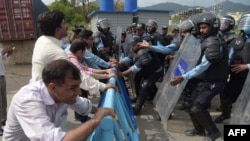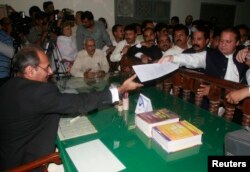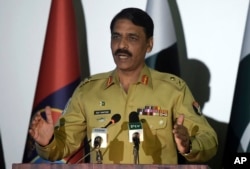Growing assaults against social media activists and journalists in Pakistan have alarmed defenders of free speech and human rights activists before the July 25 general election. There are also increasing allegations the military is also behind some of these incidents to stifle dissent.
The latest incident occurred Tuesday when Gul Bukhari, who openly criticizes the military via social media and newspaper articles, was briefly abducted while she was on her way to participate in a television talk show in the eastern city of Lahore.
The 52-year-old dual Pakistani-British national returned home safely early Wednesday after being held several hours, her family members and colleagues confirmed.
“I am well, and would request privacy at this stage,” Bukhari later stated in a message delivered to journalists. She did not say anything about who could be behind her kidnapping.
“I would like to express my deep gratitude and love to my friends, family, colleagues and supporters in civil society, journalism and politics across the board for coming together in solidarity in concern for my well being last night,” she said.
Separately, investigative journalist Asad Kharal was physically assaulted in Lahore around the same time Bukhari was abducted. Kharal was hospitalized with “multiple injuries and fractures”, according to his employer, the private BOL television channel.
Attacks awaken social media
It was also not clear immediately who was behind Bukhari’s short-lived kidnapping that instantly triggered widespread outrage on social media.
“We are very concerned at reports of Gul Bukhari’s abduction last night. As a dual Pakistani-British national, the British High Commission is reaching out with consular assistance,” Britain's diplomatic mission in Islamabad tweeted Wednesday.
Pakistani politicians and activists took to their Twitter accounts to condemn the incident. Some pointed fingers at the military for orchestrating the abduction as part of efforts to silence critics.
Pakistan military spokespeople have not commented on the allegations, nor has Bukhari or her family accused the military.
“We strongly condemn abductions and attacks on journalists and social media activists. We believe this is a clear message meant for all of us, even the dwindling band that we are now,” Tahira Abdullah, a human rights activist based in Islamabad, told VOA.
Washington-based Michael Kugelman, an expert on South Asian affairs tweeted “dissent is a right, not a crime” in his reaction shortly after the news of Bukhari’s kidnapping hit social media.
“Very troubling new. Hope she is ok. Pakistan’s current crackdown on dissent seemingly knows no bounds,” said Kugelman.
Bukhari has strongly defended Nawaz Sharif in her social media comments and newspapers articles.The former prime minister was ousted from office by the Supreme Court last July for concealing foreign assets.
Sharif and his Pakistan Muslim League-N (PML-N) party have since accused the Pakistan army of orchestrating his removal, allegations military officials reject as unfounded.
No one claimed responsibility for the attack on Kharal, though his colleagues accused members of Sharif's party for plotting the assault.
Kharal tweeted from hospital, his assailants were were “wearing masks.”
Chilling effect on freedom
A central leader of the PML-N, Ahsan Iqbal, through his twitter account denounced the attack.“Strongly condemn attack on journalist Asad Kharal. Freedom of expression should be protected.”
Popular Pakistani television anchor, Hamid Mir, while denouncing the physical assault tweeted “... the injuries on the body of Kharal are reflection the injuries of media freedom in Pakistan.”
Pakistani journalists and media organizations have increasingly complained of censorship by the military in the run-up to the July 25 parliamentary elections. Army spokesman, Major-General Asif Ghafoor, has strongly denied the charges.
Tuesday’s attacks came a day after Ghafoor accused journalists of sharing anti-state and anti-army comments on social media.
The general displayed a graphic featuring a troll account's Twitter activity and the journalists as well as other individuals allegedly connected to the account, saying the Pakistani spy agency, ISI, is monitoring such accounts and those that redistribute the propaganda against the army and the state.
The Committee to Protect Journalists (CPJ) denounced Ghafoor for making the remarks and endangering lives of Pakistani journalists and activists.
"Displaying photos of journalists alleged to help push anti-state propaganda in Pakistan is tantamount to putting a giant target on their backs," said Steven Buttler, CPJ’s Asia program coordinator in Washington.
Buttler demanded an apology from General Ghafoor for his comments and called for promoting “journalist safety in Pakistan where reporters and editors are routinely threatened, attacked, and killed for their work.”






